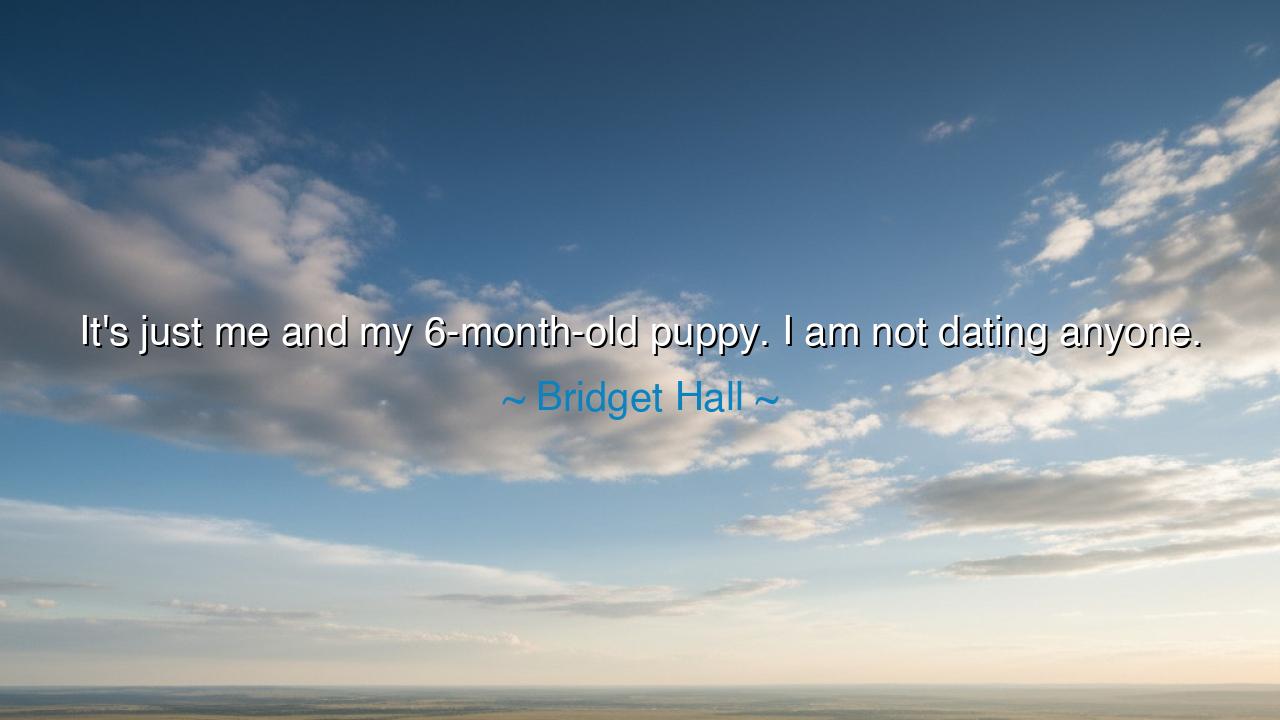
It's just me and my 6-month-old puppy. I am not dating anyone.






In the gentle and grounded words of Bridget Hall, we find a truth that is both simple and profound: “It’s just me and my six-month-old puppy. I am not dating anyone.” To some, this may sound like a passing remark — the quiet statement of someone between relationships. But to those who listen with deeper ears, it is a declaration of independence, of self-contentment, and of the quiet power found in solitude. It is the voice of one who has turned inward, choosing the companionship of innocence and loyalty over the noise of fleeting affection. In her words, there is no bitterness, only peace — the kind that comes when one no longer measures fulfillment by the presence of another, but by the serenity of one’s own company.
In every age, there are those who seek validation through the mirror of others — who believe love’s worth is proven only when reflected back. But Bridget Hall’s statement stands as a gentle rebellion against that notion. The puppy, in her words, becomes more than a creature of fur and affection — it becomes a symbol of pure companionship, free from judgment or pretense. Where human relationships may demand performance, the bond with an animal asks only for sincerity. To spend time in such simple company is to return to the essence of connection — trust, loyalty, and presence. The ancients might have said she has found friendship not in another’s gaze, but in the quiet rhythm of shared breath and faithful love.
Her words also reveal a deep acceptance of solitude, that state which so many fear yet which the wise have always cherished. The philosopher Epicurus taught that the happiest person is not the one surrounded by admirers, but the one at peace with himself in a garden of simple pleasures. Likewise, the Stoic emperor Marcus Aurelius found strength not in romance or riches, but in the calm of self-discipline and the companionship of thought. To be alone is not to be lacking — it is to be whole. In saying, “It’s just me,” Hall affirms that solitude is not emptiness, but freedom — a space where one’s spirit can breathe and grow without constraint.
History tells us of Queen Elizabeth I, who ruled England for decades without marrying, choosing instead to devote herself to her people and her vision. She called herself “the Virgin Queen,” not from pride, but from a recognition that love, while beautiful, must never enslave the will. Like Hall, she chose a path that many questioned, yet in doing so, she demonstrated that independence can itself be a form of love — love directed inward, steadfast and sovereign. Both women remind us that it is not partnership that defines one’s worth, but the peace of one’s soul.
The origin of Bridget Hall’s quote lies in her life as a model and public figure, someone whose existence is often illuminated by the harsh light of scrutiny and expectation. In such a world, where image is everything and solitude is mistaken for loneliness, her words take on the strength of quiet defiance. They say, “I do not need another to complete me.” They remind us that selfhood, like beauty, is not something bestowed — it is cultivated. Her choice to dwell in simplicity, in the loyal company of her young dog, is not retreat but renewal. It is the ancient rhythm of stepping back from the noise to remember who one is.
There is also a subtle wisdom in her choice of a puppy — a creature that embodies joy, spontaneity, and unconditional love. In caring for it, she nurtures not only the animal, but her own capacity for tenderness and patience. The puppy represents life’s simplest form of companionship — untainted by status or romance, founded solely upon the bond of affection. Through this, Hall’s words become a parable: sometimes, to rediscover love’s truest meaning, one must turn from complexity toward simplicity, from the expectations of others toward the innocence of pure connection.
Let this be the lesson: solitude is not the absence of love, but its refinement. To be alone is not to be without, but to be within — to hear one’s own voice clearly, and to give love to what is pure and near. The world may chase relationships for validation, but the wise know that true companionship begins with the self. Only those who can walk in solitude without fear are capable of walking beside another in harmony.
Action to take: cultivate the art of quiet living. Spend time with creatures or people who ask nothing but sincerity. If love comes, welcome it; if it does not, cherish the peace of your own company. Like Bridget Hall, let your heart rest in simplicity — in the laughter of a puppy, in the calm of an evening alone, in the contentment of knowing that wholeness is not found in another, but in the fullness of yourself. For those who learn to stand alone, love — when it comes — is never need, but grace.






AAdministratorAdministrator
Welcome, honored guests. Please leave a comment, we will respond soon